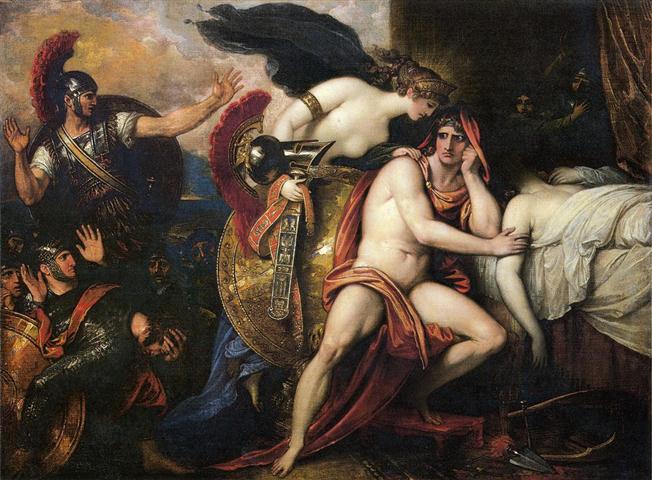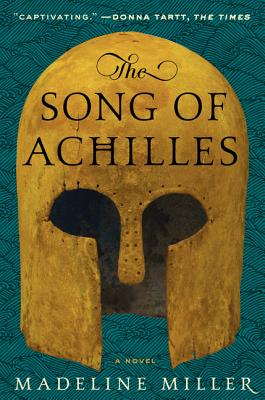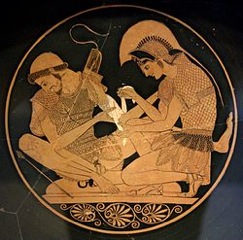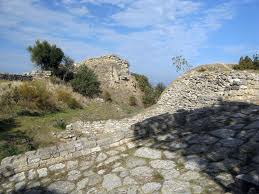 Can you tell us a little about your research process for The Song of Achilles? Were you surprised by what you found?
Can you tell us a little about your research process for The Song of Achilles? Were you surprised by what you found?
I was fortunate in that I had actually done a lot of the research for the book long before the idea of writing it ever entered my head. Achilles, Homer and ancient Greece had fascinated me since childhood, and I had taken every opportunity I could to learn more about them (including studying Greek and majoring in Classics). So by the time I decided to write the novel, I had years of reading and research within me. And it's a good thing, too: I was fresh out of college and had absolutely no idea how to go about writing a novel--if I hadn't known my material well, I would have been sunk!
As for surprises, there were lots along the way, but one of my favorites was discovering Troilus and Cressida, Shakespeare's version of The Iliad. It is an absolute pleasure--hilarious, dark, viciously angry and tragic all at once.
What drew you to the story of Achilles in particular?
I have always been deeply been moved by the visceral intensity of Achilles' grief over Patroclus' death. It is like nothing else in the rest of The Iliad, a shadow compared to his famous anger toward Agamemnon. Yet, up until that point, Patroclus has seemed to be a fairly minor character--so why is Achilles so devastated? I wanted to understand who Patroclus was, and what was between these two men that Achilles would feel so entirely lost without him.
I also feel great sympathy for the cruelty of the choice Achilles is given; to die young and be famous forever, or to live long and be forgotten. It's a brutal choice for anyone, but particularly for someone as young as he is. And once he's made it, so many of the things that anchor us--family, friendship, home and hope--become meaningless to him. He feels that, quite literally, the only thing he has to live for is his reputation.
Why do you think the Greek myths are so enduring, both thematically and narratively?
Like all great and enduring stories, I think the Greek myths contain essential truths about human experience--ambition, loss, love, injustice, family. Watching their deeply flawed heroes is so compelling because it's like watching ourselves--every time I see Icarus flying too high, I get this deep feeling of dread--for him, but also for me. I would never do that, would I? Would I?
And, of course, they are also bang-up good tales, full of adventure and action.
What were some of the challenges you faced in reinventing or reimagining this ancient tale for a modern audience?
One of the things that was foremost in my mind while writing this book was keeping it accessible. I didn't want anyone to feel intimidated by it, like they had to do homework before they could start reading. Homer has unfortunately gotten a reputation for being difficult and very high-brow--but when his poems were originally composed, they were intended for everyone. So I tried to go back to that tradition--while also leaving a few goodies for those who did know the myths well.
I also found it challenging when it came time to write scenes that I knew quite well from The Iliad--particularly the argument between Agamemnon and Achilles. Because I had Homer marching around my head, it was hard to hear my own words. I had to go through a lot of drafts before I found Patroclus' version.
 One of the surprising and fascinating themes that emerges in The Song of Achilles is the relationship between mother and son. Can you describe how this theme developed for you?
One of the surprising and fascinating themes that emerges in The Song of Achilles is the relationship between mother and son. Can you describe how this theme developed for you?
I have always felt great sympathy for Thetis. She is living a parent's nightmare: to watch her child die, and not be able to prevent it. And even though she knows it's inevitable, she fights it as hard as she can. I found that very tragic, and very human.
I also enjoyed imagining what it would be like to have a goddess--particularly such a terrifying one--as a parent. And in doing so, I realized that all parents start out seeming a little like gods to their children; they are these huge, omnipotent, inscrutable beings.
What are you working on now?
In the short term, I've been working on some personal essays, which I've enjoyed very much. In the longer term, I am feeling inspired by Homer's The Odyssey. Despite all the overlap in characters, it's a very different world than that of The Iliad, and it's wonderful to get to explore something that is at once new and familiar. I am particularly looking towards The Odyssey's ladies....






 Homer's epic poem The Iliad, for those who haven't read it for school, is one of the earliest surviving works in Western literature. It describes 10 years of the Trojan War, which carried on until the arrival of the Greek "gift horse" sealed Troy's fate. The Iliad also includes the events leading up to the war--the abduction of Helen, the assembling of an army of kings and princes (Odysseus and Agamemnon among them), and the continual interference of the gods in the affairs of mankind. Several themes are underlined in The Iliad, among them fate, honor, wrath and that most Greek combination of pride and arrogance, hubris. But one thing The Iliad is never billed as is a love story. Until now.
Homer's epic poem The Iliad, for those who haven't read it for school, is one of the earliest surviving works in Western literature. It describes 10 years of the Trojan War, which carried on until the arrival of the Greek "gift horse" sealed Troy's fate. The Iliad also includes the events leading up to the war--the abduction of Helen, the assembling of an army of kings and princes (Odysseus and Agamemnon among them), and the continual interference of the gods in the affairs of mankind. Several themes are underlined in The Iliad, among them fate, honor, wrath and that most Greek combination of pride and arrogance, hubris. But one thing The Iliad is never billed as is a love story. Until now. Patroclus is taken with Achilles from their first meeting--"I gaped at the cold shock of his beauty"--if not overly impressed with his manners. But the boys quickly become friends and Achilles takes Patroclus as his therapon (a favored companion). Achilles' destiny as a great warrior soon becomes evident, as do the deeper feelings developing between the two. But there are dark clouds hanging over this nascent romance. One is the prophecy that Achilles will die in battle. The other is Achilles' mother, the immortal and embittered sea-nymph Thetis, who not only disapproves of the relationship but uses her considerable power to keep them apart. Part of the joy of Miller's novel is in her portrayals and elevation of the female characters in The Iliad. Her Thetis is a furious, difficult, mostly absent mother. Yet the maternal love and pride she feels for Achilles is never in doubt. To keep him away from Patroclus, she sends Achilles to be educated by the centaur Chiron. But Patroclus follows and, removed from Thetis' gaze, the two fall deeply and irrevocably in love.
Patroclus is taken with Achilles from their first meeting--"I gaped at the cold shock of his beauty"--if not overly impressed with his manners. But the boys quickly become friends and Achilles takes Patroclus as his therapon (a favored companion). Achilles' destiny as a great warrior soon becomes evident, as do the deeper feelings developing between the two. But there are dark clouds hanging over this nascent romance. One is the prophecy that Achilles will die in battle. The other is Achilles' mother, the immortal and embittered sea-nymph Thetis, who not only disapproves of the relationship but uses her considerable power to keep them apart. Part of the joy of Miller's novel is in her portrayals and elevation of the female characters in The Iliad. Her Thetis is a furious, difficult, mostly absent mother. Yet the maternal love and pride she feels for Achilles is never in doubt. To keep him away from Patroclus, she sends Achilles to be educated by the centaur Chiron. But Patroclus follows and, removed from Thetis' gaze, the two fall deeply and irrevocably in love. The slow, sunlit pace of the novel undergoes a rapid shift once the scene moves to Troy. Miller's battle scenes combine thrilling action and subtle shifts in mood without sacrificing any detail, demonstrating the sure hand of a writer who knows her territory well. And it is here that she captures her readers most completely, tying the intimate story of Achilles and Patroclus to larger, resonant themes of honor, friendship and self-determination. Her lens is panoramic, her battlefield wide and bloody; yet she conveys every aspect of it in high relief, down to the glints in Achilles' armor. It is a testament to Miller's prodigious talent that all of her scenes--whether they describe the chaos of war or the secrets whispered between lovers--are equally powerful and nuanced. And as familiar as they are to us, Miller makes her characters fresh, real and undeniably human, despite their mythological attributes. Achilles is an intriguing, complicated character; at once loving, kind, arrogant and ruinously stubborn. His anger and intractability are what inadvertently cause the death of the person he loves above all else and what tips the scales toward the destiny he has been trying to outrun. But it is Patroclus readers will most relate to. An outsider and exile with none of Achilles' godly attributes, he is nonetheless a hero; an ordinary man in extraordinary circumstances.
The slow, sunlit pace of the novel undergoes a rapid shift once the scene moves to Troy. Miller's battle scenes combine thrilling action and subtle shifts in mood without sacrificing any detail, demonstrating the sure hand of a writer who knows her territory well. And it is here that she captures her readers most completely, tying the intimate story of Achilles and Patroclus to larger, resonant themes of honor, friendship and self-determination. Her lens is panoramic, her battlefield wide and bloody; yet she conveys every aspect of it in high relief, down to the glints in Achilles' armor. It is a testament to Miller's prodigious talent that all of her scenes--whether they describe the chaos of war or the secrets whispered between lovers--are equally powerful and nuanced. And as familiar as they are to us, Miller makes her characters fresh, real and undeniably human, despite their mythological attributes. Achilles is an intriguing, complicated character; at once loving, kind, arrogant and ruinously stubborn. His anger and intractability are what inadvertently cause the death of the person he loves above all else and what tips the scales toward the destiny he has been trying to outrun. But it is Patroclus readers will most relate to. An outsider and exile with none of Achilles' godly attributes, he is nonetheless a hero; an ordinary man in extraordinary circumstances.

 Can you tell us a little about your research process for The Song of Achilles? Were you surprised by what you found?
Can you tell us a little about your research process for The Song of Achilles? Were you surprised by what you found? One of the surprising and fascinating themes that emerges in The Song of Achilles is the relationship between mother and son. Can you describe how this theme developed for you?
One of the surprising and fascinating themes that emerges in The Song of Achilles is the relationship between mother and son. Can you describe how this theme developed for you?